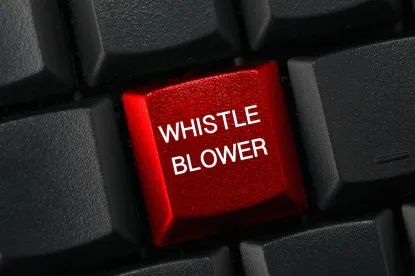On September 30, 2020, California Governor Gavin Newsom signed Assembly Bill (“AB”) 1947 into law. Effective January 1, 2021, AB 1947 will, among other things, authorize courts to award attorneys’ fees to whistleblowers who prevail against employers under Labor Code section 1102.5. This amendment will likely incentivize employees (and their lawyers) to bring retaliation claims against California employers. For our previous analysis of this bill, click here.
Existing whistleblower protections
Labor Code section 1102.5 prohibits employers from retaliating against an employee for (1) disclosing a violation of law (including state or federal statutes, or local, state, or federal rules or regulations) to a government or law enforcement agency, a person with authority over the employee, or to another employee with authority to investigate, discover, or correct the violation or noncompliance; or (2) providing information regarding a violation of law to or testifying before any public body conducting an investigation, hearing, or inquiry. Courts have broadly construed “retaliation” to include almost any adverse employment action that materially affects the terms and conditions of employment, but it typically does not include personnel decisions such as internal transfers.
Section 1102.5 also prohibits employers from (a) adopting or enforcing any rule, regulation, or policy preventing such disclosure or participation; or (b) refusing to participate in any activity that would result in a violation of law.
Remedies under existing law
The consequences for violating Section 1102.5 can be significant. Specifically, employers that violate this section may be ordered to reinstate whistleblowers with backpay and benefits (Labor Code section 98.6(b)), pay the employee’s actual damages (Labor Code section 1105), and/or pay a civil penalty of $10,000 for each violation (Labor Code section 1102.5(f), 98.6(b)(3)).
However, whistleblowers are not entitled to attorneys’ fees under existing law after prevailing under Section 1102.5. But some prevailing whistleblower plaintiffs have sought their attorneys’ fees under different statutes and theories. For example, plaintiffs’ lawyers sometimes seek attorneys’ fees under Code of Civil Procedure (“CCP”) Section 1021.5, which authorizes a court, upon motion, to award attorneys’ fees to a successful party “in any action which has resulted in the enforcement of an important right affecting the public interest,” and that confers a “significant benefit” on the general public or a large class of persons, among other things.
Courts have been less willing to grant a CCP Section 1021.5 fee motion “[w]hen the record indicates that the primary effect of a lawsuit was to advance or vindicate a plaintiff’s personal economic interests[.]” Flannery v. Calif. Highway Patrol, 61 Cal. App. 4th 629, 635 (1998). However, courts have granted fees to prevailing whistleblower plaintiffs under Section 1021.5 where the nature of the defendant’s conduct is such that the plaintiff’s lawsuit resulted in the enforcement of an important right affecting the public. See, e.g., Hawkins v. City of Los Angeles, 40 Cal. App. 5th 384, 397-398 (2019) (hearing examiners’ successful whistleblower action brought against Department of Transportation for pressuring examiners to change decisions conferred public benefit insofar as it promoted impartial hearings).
Courts may also grant attorneys’ fees to a plaintiff who brings a successful Section 1102.5 whistleblower claim under the Private Attorneys General Act. See Labor Code Section 2699.5 (“The provisions of subdivision (a) of Section 2699.3 apply to . . . [Labor Code Section] 1102.5”).
Effective January 1, 2021, Labor Code section 1102.5 will authorize attorneys’ fees
AB 1947 adds subsection (j) to Labor Code section 1102.5, which will authorize courts to “award reasonable attorney’s fees to a plaintiff who brings a successful action for a violation” of the section. Thus, whistleblowers will no longer need to seek attorneys’ fees under different statutes, and employers should expect an increase in retaliation claims.
The California Legislature’s justification for the addition is twofold. First, “[w]orkplace anti-retaliation laws are the bedrock upon which all other workplace rights rest, as “employees have no real right to minimum wage, overtime, rest breaks, worksite safety, or [freedom] from harassment if, upon attempting to exercise those rights, they can be fired immediately.”[1] Second, and relatedly, a fee-shifting provision would “help litigants obtain counsel where they might not otherwise be able to afford one,” as plaintiffs’ lawyers are more likely to take a whistleblower retaliation case where fees are guaranteed upon successful prosecution.[2]
In opposition to the Bill, the California Chamber of Commerce and other related groups argued that the addition of a fee-shifting provision would provide an “incentive for [plaintiffs’] lawyers to engage in ever greater amounts of litigation, to the detriment and distraction of business.” However, the Legislature rejected the opposition’s argument, claiming that incentivizing greater volumes of whistleblower retaliation suits by “creating greater access to legal representation, particularly for low-income workers” is exactly the point.
The opposition also argued that if the Legislature were dead-set on adding a fee-shifting provision to Section 1102.5, it should be a “two-way” shift, such that an employer could recover its fees upon mounting a successful defense. The Legislature rejected this argument outright, reasoning that doing so “would likely have the opposite of the [] intended policy effect” by disincentivizing employees with meritorious claims from bringing lawsuits “out of fear that something will go wrong and they will wind up with the bill for their employer’s legal fees.”
Changes to Section 1102.5 will not apply retroactively
The California Legislature noted that AB 1947 is “silent about its effect on pre-existing claims,” and that “[i]n the absence of clear legislative intent to the contrary, a statute is presumed to operate only prospectively.” Thus, plaintiffs who filed whistleblower retaliation claims before the bill’s effective date will not be entitled to attorneys’ fees under the newly-added fee-shifting provision.
Practical effect of these changes
In light of the forthcoming addition of attorneys’ fees to Section 1102.5, employers should prepare for a new wave of whistleblower retaliation lawsuits beginning in January 2021. Employers should ensure that their anti-retaliation policies are updated and confirm that procedures are in place such that all whistleblower complaints are thoroughly investigated and properly addressed. In addition to bracing for its impact, employers may also want to reassess their litigation strategies in whistleblower cases.
[1] See 8/21/20 Senate Floor Analyses, http://www.leginfo.legislature.ca.gov/faces/billAnalysisClient.xhtml?bill_id=201920200AB1947.
[2] See 7/28/20 Senate Judiciary analysis, http://www.leginfo.legislature.ca.gov/faces/billAnalysisClient.xhtml?bill_id=201920200AB1947




 />i
/>i
